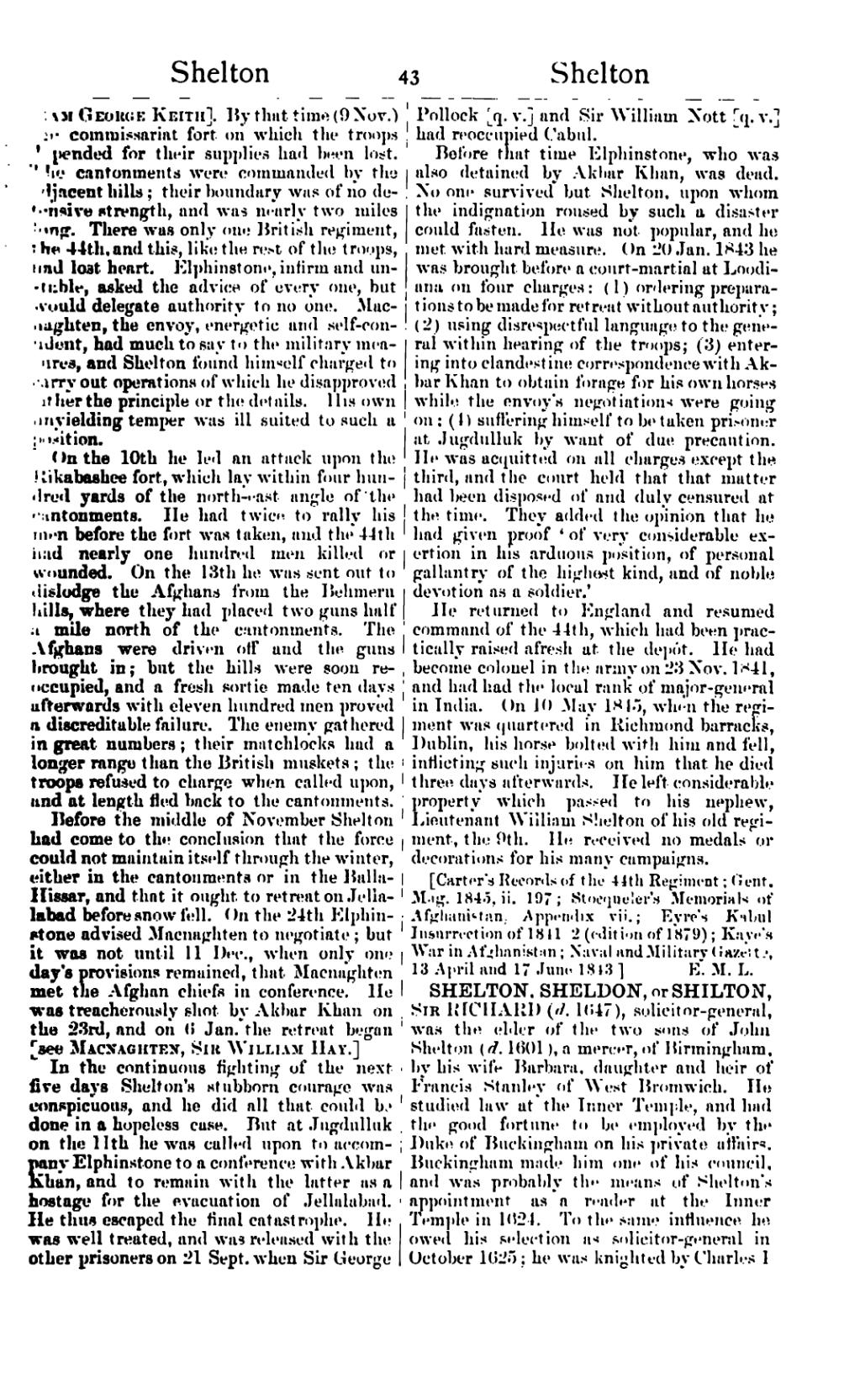iam George Keith]. By that time (9 Nov.) the commissariat fort on which the troops depended for their supplies had been lost. The cantonments were commanded by the adjacent hills; their boundary was of no defensive strength, and was nearly two miles long. There was only one British regiment, the 44th, and this, like the rest of the troops, had lost heart. Elphinstone, infirm and unstable, asked the advice of every one, but would delegate authority to no one. Macnaghten, the envoy, energetic and self-confident, had much to say to the military measures, and Shelton found himself charged to carry out operations of which he disapproved either the principle or the details. His own unyielding temper was ill suited to such a position.
On the 10th he led an attack upon the Rikabashee fort, which lay within four hundred yards of the north-east angle of the cantonments. He had twice to rally his men before the fort was taken, and the 44th had nearly one hundred men killed or wounded. On the 13th he was sent out to dislodge the Afghans from the Behmeru hills, where they had placed two guns half a mile north of the cantonments. The Afghans were driven off and the guns brought in; but the hills were soon reoccupied, and a fresh sortie made ten days afterwards with eleven hundred men proved a discreditable failure. The enemy gathered in great numbers; their matchlocks had a longer range than the British muskets; the troops refused to charge when called upon, and at length fled back to the cantonments.
Before the middle of November Shelton had come to the conclusion that the force could not maintain itself through the winter, either in the cantonments or in the Balla-Hissar, and that it ought to retreat on Jellalabad before snow fell. On the 24th Elphinstone advised Macnaghten to negotiate; but it was not until 11 Dec., when only one day's provisions remained, that Macnaghten met the Afghan chiefs in conference. He was treacherously shot by Akbar Khan on the 23rd, and on 6 Jan. the retreat began [see Macnaghten, Sir William Hay.]
In the continuous fighting of the next five days Shelton's stubborn courage was conspicuous, and he did all that could be done in a hopeless case. But at Jugdulluk on the 11th he was called upon to accompany Elphinstone to a conference with Akbar Khan, and to remain with the latter as a hostage for the evacuation of Jellalabad. He thus escaped the final catastrophe. He was well treated, and was released with the other prisoners on 21 Sept. when Sir George Pollock [q. v.] and Sir William Nott [q. v.] had reoccupied Cabul.
Before that time Elphinstone, who was also detained by Akbar Khan, was dead. No one survived but Shelton, upon whom the indignation roused by such a disaster could fasten. He was not popular, and he met with hard measure. On 20 Jan. 1843 he was brought before a court-martial at Loodiana on four charges: (1) ordering preparations to be made for retreat without authority; (2) using disrespectful language to the general within hearing of the troops; (3) entering into clandestine correspondence with Akbar Khan to obtain forage for his own horses while the envoy's negotiations were going on; (4) suffering himself to be taken prisoner at Jugdulluk by want of due precaution. He was acquitted on all charges except the third, and the court held that that matter had been disposed of and duly censured at the time. They added the opinion that he had given proof ‘of very considerable exertion in his arduous position, of personal gallantry of the highest kind, and of noble devotion as a soldier.’
He returned to England and resumed command of the 44th, which had been practically raised afresh at the depôt. He had become colonel in the army on 23 Nov. 1841, and had had the local rank of major-general in India. On 10 May 1845, when the regiment was quartered in Richmond barracks, Dublin, his horse bolted with him and fell, inflicting such injuries on him that he died three days afterwards. He left considerable property which passed to his nephew, Lieutenant William Shelton of his old regiment, the 9th. He received no medals or decorations for his many campaigns.
[Carter's Records of the 44th Regiment; Gent. Mag. 1845, ii. 197; Stocqueler's Memorials of Afghanistan, Appendix vii.; Eyre's Kabul Insurrection of 1841–2 (edition of 1879); Kaye's War in Afghanistan; Naval and Military Gazette, 13 April and 17 June 1843.]
SHELTON, SHELDON, or SHILTON, Sir RICHARD (d. 1647), solicitor-general, was the elder of the two sons of John Shelton (d. 1601), a mercer, of Birmingham, by his wife Barbara, daughter and heir of Francis Stanley of West Bromwich. He studied law at the Inner Temple, and had the good fortune to be employed by the Duke of Buckingham on his private affairs. Buckingham made him one of his council, and was probably the means of Shelton's appointment as a reader at the Inner Temple in 1624. To the same influence he owed his selection as solicitor-general in October 1625; he was knighted by Charles I
